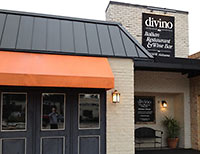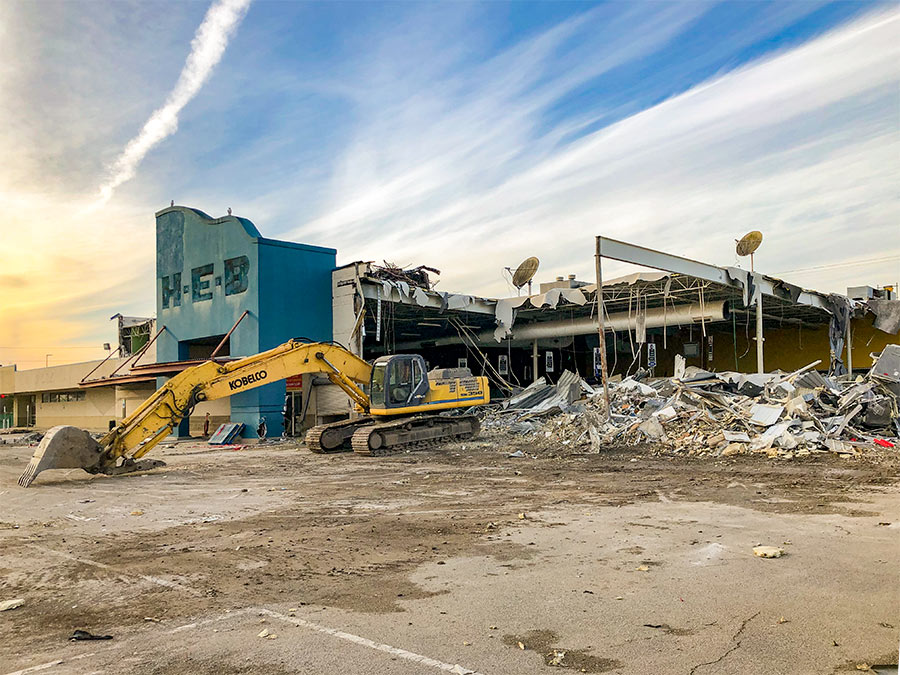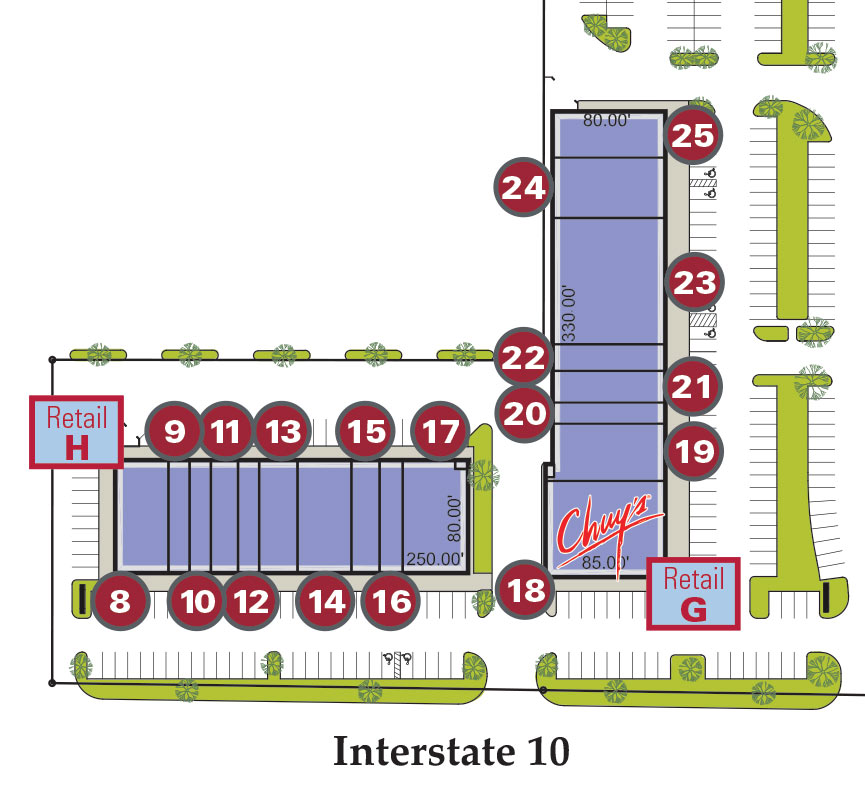A NEW TEETOTALING CIRCLE LANDS ON LANCASTER PLACE  By a vote of city council, St. Stephen’s Episcopal School today became the seventh private school in the city to be granted a 1,000-ft. alcohol-free zone around its campus. Included within that circumference around 1800 Sul Ross St.: the H-E-B Montrose Market that opened last November on the former site of the Wilshire Village Apartments. Last year St. Stephen’s lost a court battle over restricting alcohol sales at the grocery store, though the battle did end up delaying the start of H-E-B beer and wine sales until shortly before New Year’s. The new restrictions will not apply to businesses that already hold alcohol licenses, but they could make a difference to other developments planned near the corner of Dunlavy and West Alabama. [St. Stephen’s; previously on Swamplot] Photo of Divino restaurant, 1830 West Alabama: Gabe C.
By a vote of city council, St. Stephen’s Episcopal School today became the seventh private school in the city to be granted a 1,000-ft. alcohol-free zone around its campus. Included within that circumference around 1800 Sul Ross St.: the H-E-B Montrose Market that opened last November on the former site of the Wilshire Village Apartments. Last year St. Stephen’s lost a court battle over restricting alcohol sales at the grocery store, though the battle did end up delaying the start of H-E-B beer and wine sales until shortly before New Year’s. The new restrictions will not apply to businesses that already hold alcohol licenses, but they could make a difference to other developments planned near the corner of Dunlavy and West Alabama. [St. Stephen’s; previously on Swamplot] Photo of Divino restaurant, 1830 West Alabama: Gabe C.





Afraid their students are going to leave school and go get drunk at the bars?
ugh.
somehow the fact that its a private school makes it even worse.
If Private Schools insist on this, then they should be taxed. Period.
That is certainly not in the spirit of being in the Montrose community. St. Stephen’s has always been a good community neighbor and now as the area is becoming more and more gentrified, St. Stephen’s seems to be going suburban on us. Shame on you St. Stephen’s, please don’t turn your back on you very own community. Btw: I recall that the problem with St. Stephen’s high school students a few years ago was the kids were caught smoking weed and stealing their parents pills.
Idiotic.
It is amazing how our leaders can save us from sex and alcohol through all kinds of “non zoning ” zoning, but cannot save our neighborhoods from encroaching businesses, parking garages, hi rises or ultra densification. Hey Rev.Ford and Nanny Cohen here’s one for you. It is already illegal to sell alcohol to those under 21. Let the TABC enforce the rules if a problem really exists. Cohen why don’t you tackle a real issue and grease the wheels to fix the deplorable roads in your district? The property owners should fight back since they were not consulted.
Why on earth should a school care if someone’s having a drink (or buying beer at a grocery store) nearly a quarter-mile away? I just don’t see what the two have in common. Why not say you can’t sell fish within 500 feet of an ATM? It makes as much sense. And yes, I know it’s this whole puritanical streak against alcohol. Sometimes I hate this country.
The ability of small wealthy groups like this to push self-serving, and oftentimes harmful, initiatives through Houston city council is extraordinary. I cannot imagine how council thought it was in the interest of the Montrose neighborhood to do something like this. There are private schools scattered throughout Montrose (i.e. Annunciation Orthodox and the Harris School). Can you imagine the effect if all of them went down this path? In 5 years, the many bars, restaurants and other watering holes that attracted many of us to Montrose will be gone. I hope in the future, the neighborhood can get organized enough to push back against the River Oaks moms who are trying to sanitize Montrose.
Commenters, please provide your addresses so that the inebriated may be directed to your bushes and flower beds, and ‘park here, please’ signs may be installed in front of your driveways.
These blue laws come from east coast cities where most kids would walk to school. The idea was to create a big enough buffer between schools and bars/liquor stores to keep kids away from whinos who were pretty lit up by 3:00 pm when schools let out. When I was a kid, I took a city bus to school. It would let off a few blocks from my house. A whino would hang out at the bus stop and ask us for money. The guy was harmless, but it was still pretty scary.
The problem with these blue laws is that they are one size fits all solutions to problems that may exist in one neighborhood but do not exist in other neighborhoods. St. Stephens has peacefully existed with the W. Alambama Ice House for years and probably just wanted to have something to show for all the legal fees spent fighting HEB’s license. A better solution would be to have a lighter restriction within 1000 ft that would prohibit retail liquor sales, but not beer and wine, and prohibit bars from serving during school hours, or something like that.
Seriously, St. Stephens needs to worry educating their students and leaving the neighborhood alone. I can’t imagine what prompted this. If you stick your school in a neighborhood in the city, learning to deal with life in the city is part of the education. And, if you do anything to hurt Divino’s, St. Stephens, it’ll be all out war.We’ve been patronizing them from day one.
How about legislating some of the behavior of the car pool line soccer moms in their urban assault vehicles at the area private schools. They block intersections and impede ingress and egress. Rented policemen watch them do it and ignore their impact to the community and the dangerous situations they create.
Ridiculous. People don’t get drunk at HEB. They buy beer and wine and take it home.
#9 Not sure what you’re talking about but this part of West Alabama has been commercially oriented (with all kinds of bars, restaurants, stores, etc.) for a long time. Your comment reminds me of some neighbors of mine who moved to the Museum District and then moaned about the lack of parking. The law tends to ignore this kind of thing (called ‘moving to the nuisance’) for good reason. If you’re honestly worried about a few drunk folks from the bar down the street, move back to the burbs.
I think it’s a very simple vote choice for politicians… Do they side with a school full of wealthy constituents who actually contribute to campaigns and have the power and connections to take you down, or do they sign with a bunch of nonconformist hippies who always whine about stuff but almost never actually do anything about it?
Ellen Cohen has been a busybody legislator since her time in Austin. That she sponsored this is hardly surprising. The TABC has rules about businesses not selling liquor to minors. Let them enforce the laws already on the books.
Maybe St. Stephens should be banned from having school fundraisers within 1000′ of area businesses. Third graders selling cookie dough could be said to negatively impact the Chocolate Bar’s business.
The image of scary drunks rolling out of Divino and peeing on the lawn is hysterical.
But really St Stephens– that is what you are bringing to this– Hysteria.
Aren’t you guys an Episcopal school?
Don’t you still do wine for Communion?
What’s next? Creationism and no dancing?
Why should the schools have to beg city council? Just enact a 1000-foot ban around every school, daycare, and toy store. That will leave about 5 locations in the entire city that the remaining liquor stores can cram into.
Ridiculous blue laws. Enforce existing laws instead.
I don’t understand why they would try to make it illegal for HEB to get a liquor license in the first place — it’s a grocery store, for pete’s sake. I can’t buy a six pack just because there is a place of learning in the vicinity?
Come to think of it, in The Woodlands there is a shopping center with a liquor store and grocery store across the street from the place I attended elementary school. As a result, I never learned to read? See the connection, heathens?!
Lanier Middle School (only four blocks away) doesn’t seem to have said anything about all this. Do public schools already have their own thousand-foot alcohol free radii (if so, someone should tell the Firkin and Phoenix)? Or does the school simply not see fit to disrupt the commercial strips on Westheimer and Alabama?
Absolutely ridiculous. I’m amazed to see the photo of Divino heading this article: they aren’t even open during the day time school hours. Another example of of suburbia overrunning our neighborhood. It’s the school job to monitor the students, not to punish the neighborhood. Maybe it would be smarter to move the school to where the students are.